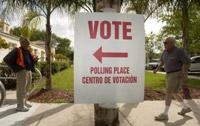| Home | Blog | Ask This | Showcase | Commentary | Comments | About Us | Contributors | Contact Us |

What about campaign finance at the state level?ASK THIS | June 166, 2004In Maine and Arizona, candidates for state office now have the option of receiving full public financing for their campaigns, in exchange for voluntarily refusing to raise private money and agreeing to abide by strict spending limits. Shouldn't other states be exploring alternatives to the current system? By Micah Sifry Q. Does the experience of running a publicly financed campaign change the relationship between candidates, voters and lobbyists? Do candidates campaign in a different way when they don’t have to spend most of their time dialing for dollars? Q. Do elected officials behave differently toward lobbyists if they haven’t taken a campaign contribution from them and don’t have to ask them for financial support? Q. It's not just for Democrats and independents. Why are so many Republicans in Maine and Arizona choosing to run with full public financing, given the vocal opposition among their national leaders to the idea? Q. In both states, there have been more competition, closer races and fewer uncontested seats, while in other states the reverse trends are seen. How much of this, if any, can be attributed to public financing? Q. Why are a group of bankers, developers, lobbyists — some with connections to the Bush-Cheney campaign and House Majority Leader Tom DeLay — spending hundreds of thousands of dollars to put a constitutional amendment on the Arizona ballot this fall that would essentially repeal the public financing system, while other state leaders, including Republican Senator John McCain and Democratic Governor Janet Napolitano, are supporting it? Q. Where else is there a push for similar state systems and what are the obstacles? How might this model be applied to presidential and congressional campaigns? What do the presidential candidates suggest be done about the role of private money in politics? Q. Ask your local elected officials: Do you enjoy raising money for your campaigns? Do you think your constituents care who gives money to you? Would you prefer to run with public financing? Why or why not? It’s great that reporters frequently include information about industries and interest groups that are giving large sums to political candidates in stories that they do about legislation or political races. But we rarely see any exploration of alternatives to the current system of privately financed election campaigns. Yet in five states, most notably Maine and Arizona, candidates for state office now have the option of receiving full public financing (also known as “Clean Money”) for their campaigns, in exchange for voluntarily refusing to raise private money and agreeing to abide by strict spending limits. In those two states, starting in 2002, it has been the political norm to run for office free of direct dependence on private campaign contributions. In Arizona, nine out of eleven statewide elected officials – including the governor, secretary of state, attorney general, treasurer and mine inspector, and four out of five members of the corporations commission – have used public financing. Aside from a very modest infusion of seed money at the start of their campaigns, the largest campaign contribution these public representatives had to collect was a $5 check. Once they qualified, by collecting a fairly large number of these $5 contributions, they agreed to abide by spending limits and appear in debates, in return receiving public funds – up to $2.3 million in the case of the winning gubernatorial candidate, Janet Napolitano. In Maine, 77 percent of the state senate and 55 percent of the state house ran with public financing. That includes Democrats, Republicans, one Green and three independents. In the Arizona state house, 45 percent of the members ran with public financing, as did 17 percent of the state senate. Overall, 152 out of 287 state elected officials in the two states, or 53 percent, have participated in public financing. The candidate qualification process for the 2004 elections is getting under way. In Maine, which held primaries June 8, 71 percent of the candidates were running with public financing -- up from 50 percent in 2002 and 31 percent in 2000. The Portland Press-Herald reports that the bumper crop of candidates has resulted in more contested primaries within parties than in 1996. (The primary in Arizona takes place on September 5.)
|




